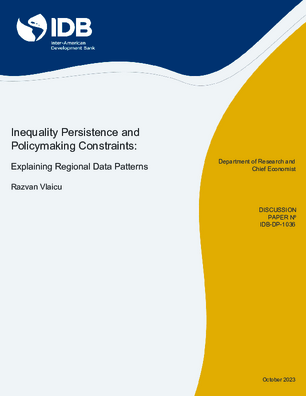Inequality Persistence and Policymaking Constraints: Explaining Regional Data Patterns (Discussion Paper)
Date
Oct 2023
In well-functioning democracies, the policymaking process should in principle respond to persistent economic inequality with corrective policies. This process is set in motion through majority demands for redistributive taxation and spending that elected representatives eventually supply through policies designed to alleviate inequality.
Policymaking constraints on both the demand side and the supply side have, however, considerably limited the extent of redistributive policies in Latin America. This paper explores recent data patterns from national and micro data to provide several process-centered explanations for the continuing high inequality observed in the region. Countries with stronger democracies have adopted more redistributive policies, even though post-tax inequality remains high in all of the region's democracies. Low citizen interpersonal and political trust both shape policy preferences away from effective redistribution. Electoral participation has risen in the more democratic countries, while economically motivated protests have increased in weakly institutionalized settings.
Policymaking constraints on both the demand side and the supply side have, however, considerably limited the extent of redistributive policies in Latin America. This paper explores recent data patterns from national and micro data to provide several process-centered explanations for the continuing high inequality observed in the region. Countries with stronger democracies have adopted more redistributive policies, even though post-tax inequality remains high in all of the region's democracies. Low citizen interpersonal and political trust both shape policy preferences away from effective redistribution. Electoral participation has risen in the more democratic countries, while economically motivated protests have increased in weakly institutionalized settings.




